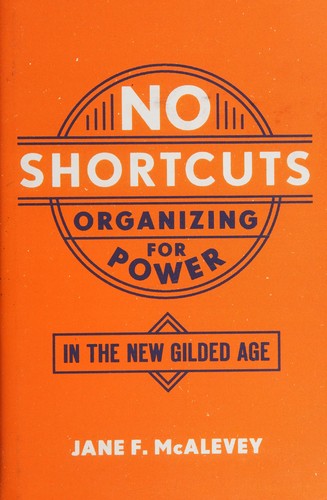User Profile
I mostly read non-fiction books on academic subjects although I'll read a few other stuff here and there.
This link opens in a pop-up window
formerlytomato's books
User Activity
RSS feed Back
formerlytomato wants to read No shortcuts by Jane McAlevey

No shortcuts by Jane McAlevey
"The crisis of the progressive movement in the United States today is so evident that nothing less than a fundamental …
formerlytomato finished reading Propaganda: The Formation of Men's Attitudes by Jacques Ellul

Propaganda: The Formation of Men's Attitudes by Jacques Ellul
Propaganda: The Formation of Men's Attitudes (1965/1973) (French: Propagandes; original French edition: 1962) is a book on the subject of …
formerlytomato finished reading Manufacturing Consent by Noam Chomsky

Manufacturing Consent by Noam Chomsky, Edward S. Herman
In this work, Edward S. Herman and Noam Chomsky show that, contrary to the usual image of the news media …
formerlytomato wants to read Coiled Verbal Spring by Viktor Shklovsky

Coiled Verbal Spring by Viktor Shklovsky, Boris Michajlovič Ėjchenbaum, Yuri Tynyanov, and 3 others
The book includes the Russian Formalists' (Viktor Shklovsky, Boris Eikhenbaum, Yuri Tynyanov, Boris Tomashevsky, Lev Yakubinsky, and Boris Kazansky) most …
formerlytomato wants to read Wild Socialism by Martin Comack
formerlytomato quoted Age of Extremes by Eric Hobsbawm
The third peculiarity of the new youth culture in urban societies was its astonishing internationalism. Blue jeans and rock music became the marks of ‘modem’ youth, of the minorities destined to become majorities, in every country in which they were officially tolerated and in some where they were not, as in the USSR from the 1960s on (Starr, 1990, chapters 12 to 13). The English language of rock lyrics was often not even translated. This reflected the overwhelming cultural hegemony of the USA in popular culture and lifestyles, although it should be noted that the heartlands of Western youth culture themselves were the opposite of culturally chauvinist, especially in their musical tastes. They welcomed styles imported from the Caribbean, Latin America and, from the 1980s, increasingly Africa.
formerlytomato quoted I and Thou by Martin Buber
Man’s world is manifold, and his attitudes are manifold. What is manifold is often frightening because it is not neat and simple. Men prefer to forget how many possibilities are open to them. They like to be told that there are two worlds and two ways. This is comforting because it is so tidy. Almost always one way turns out to be common and the other one is celebrated as superior.
Those who tell of two ways and praise one are recognized as prophets or great teachers. They save men from confusion and hard choices. They offer a single choice that is easy to make because those who do not take the path that is commended to them live a wretched life.
To walk far on this path may be difficult, but the choice is easy, and to hear the celebration of this path is pleasant. Wisdom offers simple schemes, but truth is not so simple.
formerlytomato quoted From Crisis to Communisation by Gilles Dauvé (Revolutionary Pocketbooks)
History is made by conscious acts, which involve decisions … which are not based on free will. It would be pointless to replace nineteenth-century determinism (based on a widespread belief in progress, shared by bourgeois and socialists alike) by contemporary undeterminism (influenced by the cultural pessimism of a self-doubting society).
— From Crisis to Communisation by Gilles Dauvé (Revolutionary Pocketbooks)
formerlytomato quoted From Crisis to Communisation by Gilles Dauvé (Revolutionary Pocketbooks)
Revolution is neither the fruit of long-cultivated undermining action, nor of will power. It was off the agenda in 1852, in 1872, or in 1945 (although some comrades mistook the end of World War II for the dawning of a new Red October). Not everything is possible at any given time. Critical moments give opportunities: it depends on the proletarians, it depends on us to exploit these capabilities. Nothing guarantees the coming of a communist revolution, nor its success if it comes. A historical movement keeps developing because its participants make it do so. A revolution withers when people stop believing in it and no longer rise to the challenge they have initiated. History is not to be understood with the mind of the chemist analysing molecular reactions. The closer communist theory gets to “science,” the less communist it becomes. Communism is not to be proved.
— From Crisis to Communisation by Gilles Dauvé (Revolutionary Pocketbooks)
formerlytomato wants to read Albion's Seed by David Hackett Fischer (America: A Cultural History, #1)

Albion's Seed by David Hackett Fischer (America: A Cultural History, #1)
Albion's Seed: Four British Folkways in America is a 1989 book by David Hackett Fischer that details the folkways of …
formerlytomato wants to read African Founders by David Hackett Fischer
formerlytomato wants to read How the World Ran Out of Everything by Peter S. Goodman

How the World Ran Out of Everything by Peter S. Goodman
How does the wealthiest country on earth run out of protective gear in the middle of a public health catastrophe? …
formerlytomato wants to read Spectacular Vernaculars by Russell A. Potter (The SUNY Series in Postmodern Culture)

Spectacular Vernaculars by Russell A. Potter (The SUNY Series in Postmodern Culture)
Viewing hip-hop as the postmodern successor to African American culture's Jazz modernism, this book examines hip-hop music's role in the …
formerlytomato quoted Evangelical theology by Karl Barth
This isolation must be endured and borne, and it cannot always be easily borne with dignity and cheerfulness. Such isolation is hard to bear because fundamentally it seems not to correspond to the essence of theology. Indeed, to assume a theological post in some remote place from which the public is all but excluded seems strikingly to contradict the character of theology. Religion may be a private affair, but the work and word of God are the reconciliation of the world with God, as it was performed in Jesus Christ. The object of theology, therefore, is the most radical change of the situation of all humanity; it is the revelation of this change which affects all men. In itself, revelation is undoubtedly the affair of the general public in the most comprehensive sense. What it has spoken into human ears demands proclamation from the housetops.
— Evangelical theology by Karl Barth (Page 111)












